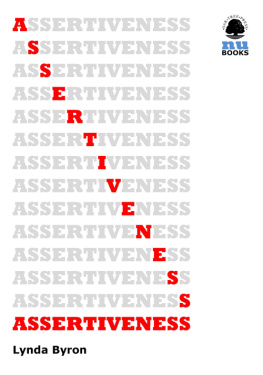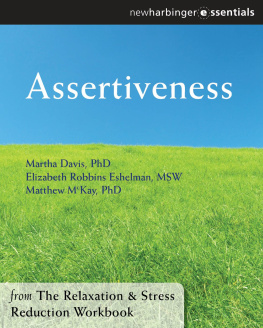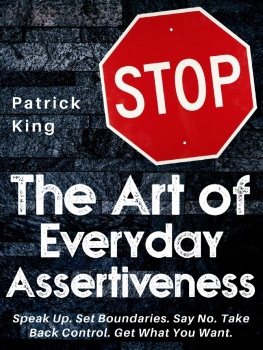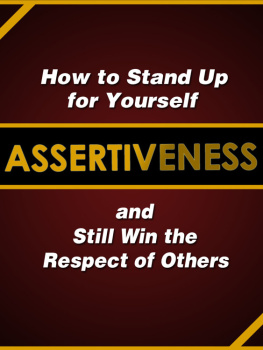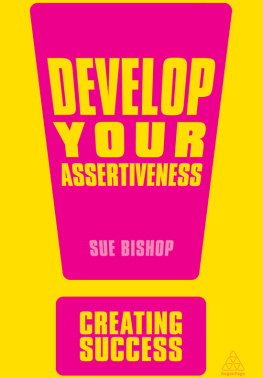Lynda Byron - Assertiveness
Here you can read online Lynda Byron - Assertiveness full text of the book (entire story) in english for free. Download pdf and epub, get meaning, cover and reviews about this ebook. year: 2011, publisher: Oak Tree Press, genre: Home and family. Description of the work, (preface) as well as reviews are available. Best literature library LitArk.com created for fans of good reading and offers a wide selection of genres:
Romance novel
Science fiction
Adventure
Detective
Science
History
Home and family
Prose
Art
Politics
Computer
Non-fiction
Religion
Business
Children
Humor
Choose a favorite category and find really read worthwhile books. Enjoy immersion in the world of imagination, feel the emotions of the characters or learn something new for yourself, make an fascinating discovery.
- Book:Assertiveness
- Author:
- Publisher:Oak Tree Press
- Genre:
- Year:2011
- Rating:5 / 5
- Favourites:Add to favourites
- Your mark:
- 100
- 1
- 2
- 3
- 4
- 5
Assertiveness: summary, description and annotation
We offer to read an annotation, description, summary or preface (depends on what the author of the book "Assertiveness" wrote himself). If you haven't found the necessary information about the book — write in the comments, we will try to find it.
Assertiveness is not what you are, but what you do. Its about behaviours. Its also about rights not about always demanding your rights but being aware of them and getting what youre entitled to without upsetting others - a difficult balance.
Assertiveness — read online for free the complete book (whole text) full work
Below is the text of the book, divided by pages. System saving the place of the last page read, allows you to conveniently read the book "Assertiveness" online for free, without having to search again every time where you left off. Put a bookmark, and you can go to the page where you finished reading at any time.
Font size:
Interval:
Bookmark:
Adams, A. and Crawford, N. (2000). Bullying at Work How to Confront and Overcome it, London: Virago.
Back, K. and Back, K. (1999). Assertiveness at Work A Practical Guide to Handling Awkward Situations, London: McGraw-Hill.
Bishop, S. (2000). Develop Your Assertiveness, London: Kogan Page.
Graves, D. (2002). Fighting Back Overcoming Bullying in the Work Place, London: McGraw-Hill.
Lindenfield, G. (2001). Assert Yourself Simple Steps to Getting What you Want, London: Thorsons.
| Some Behaviours to look out for | Passive | Aggressive | Assertive |
|---|---|---|---|
| Body language | Minimal eye contact. Taking up very little space. Wringing hands. Not easily noticed. Shoulders slumped. Fidgeting. Worried or uncertain facial expressions. Walking unsteadily or nervously. | Excessive eye contact. In other peoples space. Finger-wagging and pointing. Feet wide apart when standing, shoulders back, chest puffed out, sometimes hands on hips, head up straight, often leaning forward. Angry or sneering facial expressions. Walking quickly and heavily. | Just the right amount of eye contact. Taking up own personal space. Standing confidently. Steady on feet. Relaxed gestures. Smiling or pleasant facial expressions. Walking steadily and firmly. |
| Voice tone | Quiet, sometimes squeaky or shaky voice. Doesnt always finish sentences. Hesitant, questioning tone. Uses phrases like I just want to.., I think that maybe. | Loud, obtrusive voice. Defiant, harsh tone. Telling rather than asking. Uses phrases like Youd better, or else, I want ..., Why the hell not?. | Firm, moderate, neutral voice. Asking rather than telling. Calm, pleasant tone. Uses phrases like I would like, We can work out how to do this together. |
| Actions | Often says Yes when meaning No. Avoids conflict. Bottles things up. Puts others needs first. Doesnt express feelings. Apologises excessively. | Quick to blame others. Criticises the person, not the behaviour. Uses sarcasm, ridicule, criticism. Makes requests sound like orders. | Listens to understand. Treats others with respect. Explains or states needs and wants. Solution-centred. Straight but not abrupt. Persists nicely. |
| Advantages | You avoid confrontation. | You achieve a short-term victory. | You achieve results. People like and respect you. Your confidence and self-esteem remain strong. You build good relationships. You suffer less stress. |
| Disadvantages | Youre not taken seriously. Your viewpoint can be ignored. You dont achieve your potential. You suffer stress. People dont respect you. | You lose in the long-term. It irritates people. People avoid you. You dis-empower staff as you stop them using initiative. | There are no downsides to assertive behaviour. |
Lynda Byron is a management specialist at IMI, who specialises in general management, communications skills and customer service. Her client list includes companies in many European countries in a variety of sectors: public, private, blue chip and SMEs. She has extensive experience in developing large-scale interventions for high potential managers to ensure effective succession-planning in organisations. She is noted for her capacity to create a positive learning environment that is both challenging and enjoyable. She has a Masters degree from University of Dublin, Trinity College and is the author of a number of books and articles on presentation skills, assertiveness and managing customer service.
At the time of original print publication, Marion OConnor, John Cullen and John Mangan were Management Researcher, Senior Management Researcher and Director of Research respectively at IMIs Centre for Management Research and the editors of the IMI Handbook of Management, on which this ebook is based.

Assertiveness is extracted from the IMI Handbook of Management (ISBNs 978-1-86076292-5 hardback, 978-1-86076-293-2 paperback), edited by Marion OConnor, John Cullen and John Mangan, and published by Oak Tree Press, www.oaktreepress.com, in association with IMI).
The titles in this ebook series include:
- Managing Your Time.
- Getting Things Done.
- Managing Stress & Your Health.
- Planning Your Career.
- Motivating Others.
- Building Effective Teams.
- Negotiating Effectively.
- Facilitating Meetings & Chairing Discussions.
- Managing People.
- Managing Customers.
- Presentation & Communication Skills.
- Internal Communications.
- Assertiveness.
- Influencing Others.
- Gathering Business Information.
- Business Writing.
- Managing in Changing Times.
- Managing Outsourcing.
- Doing Business Strategy.
- Leadership.
Oak Tree Press develops and delivers information, advice and resources for entrepreneurs and managers. It is Irelands leading business book publisher, with an unrivalled reputation for quality titles across business, management, HR, law, marketing and enterprise topics.
In addition, through its founder and managing director, Brian OKane, Oak Tree Press occupies a unique position in start-up and small business support in Ireland through its standard-setting titles, as well training courses, mentoring and advisory services. Oak Tree Press is comfortable across a range of communication media print, web and training, focusing always on the effective communication of business information.
Oak Tree Press, 19 Rutland Street, Cork, Ireland.
T: + 353 21 4313855 F: + 353 21 4313496.
E: .
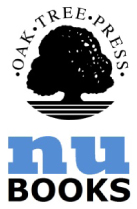
- Understand the importance of being assertive.
- Learn the three building blocks of assertive behaviour.
- Develop tactics for being assertive.
- Know how to deal with bullying.
Assertiveness has had a lot of bad press over the years. Images of assertive people strutting around the office, demanding their rights and not taking No for an answer hasnt helped. This image, of course, has nothing to do with real assertive behaviour, its simply someone who has got out of hand.
Assertiveness is not what you are, but what you do. Its about behaviours. Its also about rights not about always demanding your rights but being aware of them and trying to find a way of getting what youre entitled to without upsetting others. This can be a difficult balance to achieve but very satisfying when you do.
First, lets look at the two extremes:
- You have lots of ideas of what could be done but no one listens to you. You wish you could stand up to others when it is important and you know youre right. You would love to be able to speak up at meetings and really get your point across you often leave meetings without giving your opinion or mentioning your good idea. You sometimes feel intimidated by hostile or angry colleagues or customers or even your boss. You dont seem to get noticed by others. Even when it was your idea, someone else gets the credit. Presentations and interviews make you squirm.
Font size:
Interval:
Bookmark:
Similar books «Assertiveness»
Look at similar books to Assertiveness. We have selected literature similar in name and meaning in the hope of providing readers with more options to find new, interesting, not yet read works.
Discussion, reviews of the book Assertiveness and just readers' own opinions. Leave your comments, write what you think about the work, its meaning or the main characters. Specify what exactly you liked and what you didn't like, and why you think so.

